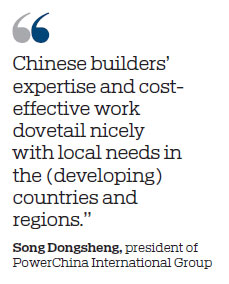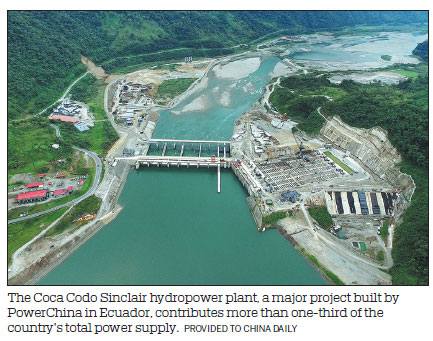PowerChina gives back to communities via projects
Spurred by the Belt and Road Initiative, PowerChina has been riding high with its overseas expansion, said Song Dongsheng, president of PowerChina International Group.
The subsidiary of Power China - a Chinese engineering giant specializing in the sectors of power, renewable energy, infrastructure and real estate - is dedicated to businesses abroad.
PowerChina reported a 12.39 percent increase in new overseas contract value in 2018 from the previous year. It is contracted to build more than half of all medium and large-scale hydropower plants worldwide, according to the company.
"Developing countries are our focus in marketing, where there is strong demand for hydropower due to serious power shortages," Song said.
"The Belt and Road Initiative enables a perfect combination of commercial interest and commitment to local communities," he noted. "Chinese builders' expertise and cost-effective work dovetail nicely with local needs in the countries and regions."

He cited the Coca Codo Sinclair hydropower plant in Ecuador as an example, which was open to international bids in 2008.
In cooperation with partners from Italy and Ecuador, Sinohydro, a subsidiary of PowerChina, won the contract bid for the CCS project. Construction began in 2010 and the plant was put into operation in 2016.
The plant, reportedly the largest of its kind in the region, has contributed 35 percent of Ecuador's total power supply since April 2016, data from the local power supervision authorities show.
It has helped the country upgrade from an energy importer to energy exporter, a local official said.
The project provides direct employment for some 7,000 local residents and has created 15,000 jobs in related sectors, according to the company.
"More than 80 percent of our employees recruited for the project were from local communities," Song said, adding that many of them have gone on to become senior technicians or managers.
The turbines and generators used were provided by a Sino-Austrian joint venture and the tunnel boring machines and other key equipment were imported from Germany. But the local purchase of equipment and other materials required for the project accounted for 15 percent of the total, which also boosted the local economy, according to the company.
Environmental concerns were a priority consideration in the project design and construction, Song said.
He noted an oil painting of the CCS hydropower plant hanging on the wall in his office. The painting was created by a well-known local artist. Song explained that the project features an eco-friendly water-division system with the downstream tail-water returning to the Coca River, across which a 36-meter-high gate dam spans at the plant.
The design aims to reduce the environmental impact on the ecosystem, he said.
The operation has won acclaim from the local government.
The China International Contractors Association named the CCS hydropower plant as a model of overseas Chinese project sites in 2016, and awarded it as an overseas Chinese-developed sustainable infrastructure project in 2017.
Just a few days after part of the generators began working at the CCS, a 7.8 - magnitude earthquake hit Ecuador in April 2016, damaging other power plants in the country.
In response, the CCS project, which endured the disaster due to its high quality, decided to add a new generator, which was still being adjusted, to its working generators, in a bid to help deal with the difficulties in power supply.
At the same time, Power China joined the rescue eforts immediately after the earthquake and repurposed its removable residential facilities for use as a school that could house 2,000 students in the earthquake-affected area.
The company also donated three diesel generators and badly-needed materials worth $100,000 to the disaster victims.
In addition, the company helped to build sewage and garbage treatment facilities as well as an agroproducts market.
A shortage of skilled workers can often be a problem for PowerChina that has multiple projects all over the world. To solve this, in Zambia, the company has opened a vocational school to offer free technical training, as well as employment opportunities. Students are provided free accommodation and other allowances.
To date, the school has offered five full training sessions, benefiting more than 270 trainees.
Song said such activities form part of the company's corporate social responsibility. "The engineering projects that we engage in provide local residents with affordable electricity and thus reflect our largest CSR efforts."
In remote rural regions, where villages are poor and scattered, power supply still remains a challenge, he said.
Five to six research teams in his company are working toward breakthroughs in technological innovation and business modes designed for such areas.
The company has shifted its role from being a project contractor to a solutions provider, "listening to the needs from customers and integrating our projects into local communities to help the destination achieve sustained development," Song said.
Defining engineering prowess as his company's core competitiveness, the president said PowerChina's businesses extend from project construction to development and operation, covering the entire industrial chain.
Song said the BRI provides a prescription for connecting the world and helps to address fundamental issues.
Connectivity is the key to the initiative, from infrastructure to flows of goods and people-to-people exchanges, he noted. "The BRI encourages us to build roads and bridges open to each other, rather than walls that close us of."

(China Daily Global 04/26/2019 page10)


















